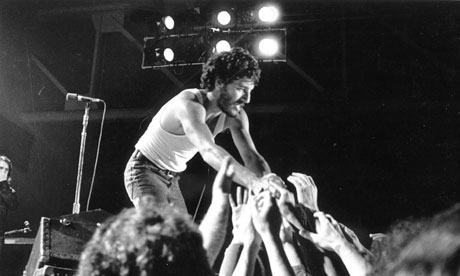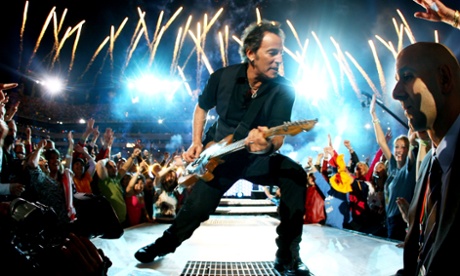In 2000 I interviewed Badly Drawn Boy for Select magazine and asked him about his obsession with Bruce Springsteen. In the Select office, this was the source of some bemusement. It was during Springsteen's lost decade, when he moved to California, remarried, sacked the E Street Band and released commercially limp (though not terrible) albums. In 2000, especially to a lo-fi singer-songwriter such as Badly Drawn Boy, Springsteen seemed as eccentric an object of passion as Billy Joel. But when Badly Drawn Boy talked about seeing Springsteen on television for the first time as kid, his eyes glowed with the zeal of the true believer.
In 2012 there is nothing eccentric about Springsteen fandom. Rekindling his bromance with the E Street Band while ramping up his political activism, he has reaffirmed his place in the rock landscape as a kind of liberal, baby-boomer Superman, and no praise is deemed too excessive. The writer and broadcaster Sarfraz Manzoor has written a memoir (Greetings from Bury Park), Radio 4 documentary (From Luton Streets to Jersey Shores) and an Edinburgh fringe show (The Boss Rules) about his Bruce love. The Observer's Ed Vulliamy ended a long, detailed salute to Springsteen's protest-singing credentials with the prose equivalent of a sweaty air-punch: "Bring on Bastille Day! Bring on the Boss!" In Salon, Joan Walsh recently wrote about a Springsteen show in language as hyperbolic as her idol's grandest songs. "As he passed above me, dressed in all black, drenched in sweat, I felt his literal body weight in my hands as I handed him back to the folks behind me. (I had a lot of help – we were never in danger of dropping him, only of maybe devouring him with love, lust and need.) The corporeal reality, his body in my hands, reminded me for one eerie moment of the duty of a pall-bearer." Biographers melt in his presence: City University of New York professor Marc Dolan's new book bears the grandiose title Bruce Springsteen and the Promise of Rock'n'Roll. Critics no longer write reviews of his concerts so much as testimonials.
Although I've grown fond of parts of Springsteen's catalogue, I know I'm only a part-timer. Watching him headline Glastonbury in 2009, I felt like an atheist in church, albeit one in the company of several other atheists complaining about his failure to play Born in the USA. There was something happening further down the field that felt as alien to me as a revival meeting. As Slate's Stephen Metcalf wrote: "Springsteen is no longer a musician. He's a belief system. And, like any belief system worth its salt, he brooks no in-between … And so we've reached a strange juncture. About America's last rock star, it's either Pentecostal enthusiasm or total disdain."
So what's going on here? A few qualities are obvious. Springsteen is principled, decent, loyal, outspoken without being pompous and he still looks good in jeans. He enjoys both the auteurish cachet of a solo artist and (the 90s aside) the through-thick-and-thin mythos of a band. Even if you can't stand a note of his music, he's plainly one of the good guys.
But there's something else. Descriptions of pop fandom (as catch-alls go I've always preferred "pop music" to "rock'n'roll") tend to be strongly gendered. Men, goes the assumption, are serious about the art. They collect all the records, catalogue the live shows, debate the minutiae with fellow disciples. Take Dylanologists, who pore over the sacred texts with the intensity of Talmudic scholars. Meanwhile women, or rather "girls", scream at pop stars. We may have moved on from the days of Lisztomania, when female fandom was described in terms of mental illness, but the prejudice endures. Gig reviewers tend to describe crowds at boy-band shows in a tone of puzzled alarm, like Victorian anthropologists observing some gory and baffling ritual.
Springsteen fans shatter that artificial distinction. They don't just respect the art, they love the man. He's the Dylan who will return your calls, the Neil Young who will join you for a beer. His heart outweighs his brain (by which I mean to praise his heart rather than diminish his brain). No other rock star of his stature would happily consent to having his photograph taken with a string of journalists, as Springsteen will do in gatherings of them, or find so many takers willing to ditch their usual professional reserve for an arm-around-shoulder snapshot. Writers who have outgrown the intensity of their adolescent crushes find themselves giddy teenagers again.
Of course, the myth of Springsteen began with a man worrying that he was too old for rock'n'roll. When critic-turned-manager Jon Landau wrote his famous line, used in subsquent newspaper ads, "I saw rock and roll future and its name is Bruce Springsteen," he didn't mean Springsteen was the future of rock'n'roll." He meant that he realised, as a fan, that he had a future with this music after all. In the next line he wrote: "On a night when I needed to feel young, he made me feel like I was hearing music for the very first time."
The language of epiphany and rebirth, echoing a religion-conversion narrative, repeats itself even now. Salon's Joan Walsh called the Springsteen show she attended "a thoroughgoing, transcendent exercise in communal grief and joy" and concluded: "If there were a church like this, I'd be there every Sunday." In Tramps Like Us: Music and Meaning Among Springsteen Fans, college professor Daniel Cavicchi writes that a concert "filled me up with electricity and sound and a strange sensation that I could do or be anything I wanted". In his interviews with fans, Cavicchi found the phrases "religious experience" and "spiritual experience" appearing again and again.
Some fans will tolerate criticism and accept that there's a leap of faith involved. In his essay collection 31 Songs, Nick Hornby concedes that his favourite ever song, Thunder Road, is "overwrought", "po-faced" and "corny", but argues that it "knows how I feel and who I am, and that, in the end, is one of the consolations of art." Say Born to Run sounds like Meat Loaf. Say he's a ham. Say his lyrics are too obvious – as Hornby notes, "surely the word 'redemption' is to be avoided like the plague when you're writing about redemption". Smart Springsteen fans won't say "no" but "yes, so what?" His occasional ridiculousness is not the failing I used to think it was: it's core to his appeal, as Lady Gaga understood when she hired the late Clarence Clemons to help her go gay-techno-Boss on last year's Edge of Glory. He gives you license to be ridiculous yourself, however old you are.
I think I like this Bruce Springsteen. Not the man I grew up perceiving as an icon of that dreadful, bogus concept "authenticity" and the hoary, blokey mythology of "rock'n'roll", but the pop star who turns people who thought they'd outgrown this into screaming kids, going home to scrawl his name on their exercise book with hearts around it, or write articles that end with exclamation marks. Slate's Stephen Metcalf talks about "peeling back all the layers of awful heartland authenticity and rediscovering the old Jersey bullshitter underneath". He doesn't mean the cynical, numbing, everyday bullshit we all deal with but a joyous, transcendent, suspension-of-disbelief bullshit that invites you to surrender for a couple of hours. I may not be right there on the front row but that's the kind of bullshit I can't help but admire.









